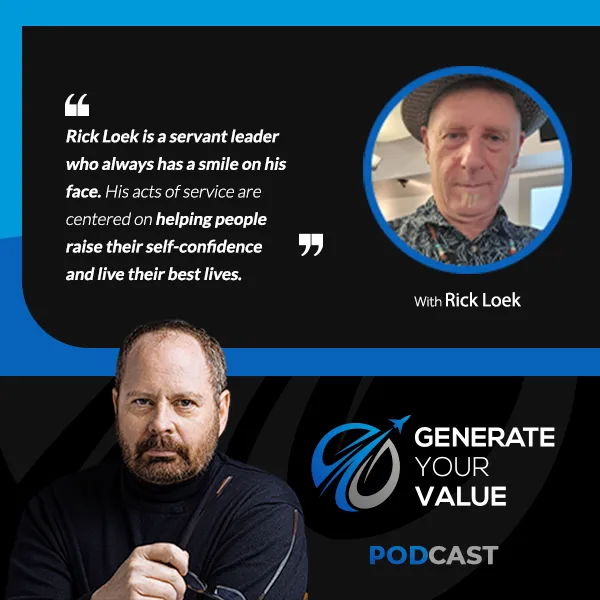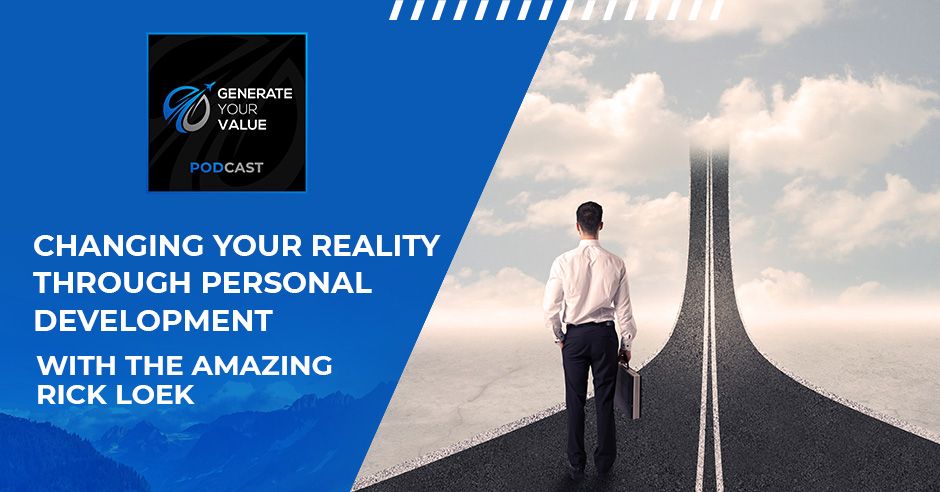No matter what your shortcomings are, your life is what you make it. By going down the path of personal development and transformation, you can turn even your lowest points into incredible strengths. Joining Andy McDowell is the original recovering software engineer, The Amazing Rick Loek. He talks about his journey as a self-taught programmer who fully embraced his ADHD diagnosis. Rick explains how he used his uniqueness as a catalyst to bring happiness, hope, and confidence to other people. He also opens up about approaching money in the most positive way and addressing life as it overlaps with business.
LISTEN TO THE PODCAST HERE
Changing Your Reality Through Personal Development With The Amazing Rick Loek
You’ve come to the right spot to understand how joy, happiness, and success can show up in your life. I’ve brought on a guest who’s going to help us understand what that journey is. I don’t have all the answers. I like to think I do, but I don’t. I’m a human being. I make mistakes. I don’t always have it right all the time. I don’t make the best decisions at times, but I do learn from them.
My guest is Mr. Rick Loek and he’s known as The Amazing Rick. We’re going to try and pull that out in this episode to understand what makes Rick Loek so amazing. I know he is because I’ve spent time with him but I want to share that with you in this episode so that you can understand that. His bio is going to help you on that journey to understand what makes him so amazing and then we’re going to bring him in for a wonderful conversation.
His bio starts as follows. The Amazing Rick’s path started in the mid-1980s when he became a father. Nothing can develop you to be a father. One just becomes that and in Rick’s case, literally overnight. From that day forward, Rick and his family have been on an adventure, growing and overcoming obstacles and learning how each obstacle is an opportunity.
When not advising and coaching clients, Rick enjoys spending time with his wife and two adult children, including the son with special needs, and advocating for the rights of underserved people in his community. Rick is sharing this moniker, “The Amazing Rick,” not to impress you. He is sharing this to impress upon you. He has done his work and continues to train and teach others. By teaching others, his foundation continues to solidify.
To further clarify, the moniker came about from clients and friends stating, “You are amazing.” Ultimately, what makes Rick “The Amazing Rick” in its simplest form has absolutely nothing to do with him. What makes Rick amazing is the people just like you. There are many demonstrations of this way of being too numerous to list here. The Amazing Rick is someone people enjoy getting to spend time with, skilled at making any situation comfortable and filled with compassion.

Being a highly effective entrepreneur, The Amazing Rick’s commitment is to make a difference in as many lives as possible. Specifically, he is looking at creating two entities that will help people lift themselves up through training and personal development. Primarily, The Amazing Rick uses his training to educate people regarding the most taboo of all subjects, which is money. A few words have the power to cause such an emotional response as the word money.
Money is at the heart of the discussion. People’s limitations and how to 1) Identify and see them, 2) How to powerfully address the limitations, and 3) Create new ways of being and taking action. This leaves people empowered and confident. Rick started his career in the software field and has been heavily influenced by the likes of Napoleon Hill, Stephen Covey, Dr. Matt James, John C. Maxwell, Werner Erhard of Landmark Education and the list goes on and on.
Hopefully, some of those names are familiar to you. If they’re not, they should be. If they’re not familiar to you, that means you’re not growing and maybe you’re in the wrong show or maybe you are in the right podcast because you want to grow and you’re just starting on your journey. If so, welcome. You’ve come to a great place to help you with that. Rick or I should say, “The Amazing Rick,” welcome to the show. Thank you for coming and joining us for a great conversation.
Thank you, Andy. I appreciate the invitation to be here.
We love storytelling around here. The audience, if they tune in regularly, knows two things will always happen. 1) It is going to start with your story, and 2) It is going to end with a particular question. Everything else in between is up for grabs depending on who the guest is. Let’s start with a story. You started with software. In Intel, right?
Yes, sir. I was working the swing shift in a warehouse and the company had brought in a couple of Apple IIes and, eventually, an IBM PC. This was in the very early 1980s and we had just gone through some mandatory reduction in salary and all those other stuff because of the economic situation at the time. I was handed these PCs to do some work. I taught myself something called VisiCalc. There was also another piece of software called dBase II. I started teaching myself that and BASIC.
Long story short, I wrote a program that would allow us to patch these process cards. The silicon goes through the manufacturing process with what they called a run card. If whoever printed the card made a mistake, throw those all out and go get them reprinted with a mistake fixed. I came up with a way to print the run card in mass or in total or even create stickers to fix the run card. As a guy whose job was to work in the warehouse, this caught the attention of the people in management. They have something called rankings and ratings. They do your performance review on a curve. That pushed me to the top of the curve pretty quickly.
I taught myself to program computers. I went on from there to enjoy a couple of different startups and ultimately, in the early 2000s, I started phasing out software into training and self-development. In that process, I created another company, my own investment advisor company, which is where I work with people’s retirement assets. That’s the so-called day job. I work with people’s mindsets and things along those lines, but mostly with their assets.
What was it about your journey through the software or IT ranks that flipped? You have the same journey that I have had. Mine was in the aviation industry, yours is IT and tech, but we both left and decided to concentrate on this personal development coaching shindig. What was it for you that flipped that switch?
I would say that the level of stress and software is pretty intense. This was in the very early 2000s. You might have heard of something called the dot-com bubble and a few other things like that. At that point, I was a ripe young 40-ish-year-old and go into interviews. A couple of months before, if you could fog a mirror and you knew what a keyboard was, you were trainable. The dot-com bubble happened and you needed to have the very precise thing that was being looked for. It helped a lot if you were 20 and not 40. They would trade in a 40-year-old for two 20-year-olds.
The stress was pretty intense. I was pretty good at what I did, and I came across at that point, Landmark Education. Somebody introduced me to the Landmark Forum. I ended up participating in that. On the other side of my skillset, I’m gifted with ADHD, and the other side of being distractable is hyperfocused. At Landmark, they have something called the Curriculum for Living. I went through the Curriculum for Living with a rocket jet on my back.
In about nine months, I accomplished the introductory program, the advanced program, the self-expression and leadership program, the Introduction leader program, three communication courses, and a couple of different seminars. I then went, “Ooh.” I went on and took on triathlons, went back into Landmark, and became a program leader for Landmark. I did that for about eight years. That’s where the transition or the switch flipped. I would say to your readers, you’re in the right spot. If you want to figure out how to grow who you are and change everything from obstacles to opportunities, this is the conversation to be in.
The thing is about the IT industry, I learned this through my work to get my Master’s. I got it through business school with a Computer Information Systems degree. It was the marriage of IT and business and the garden for growing into a CIO or CTO position for a company where you’re trying to marry the two things together. In the early stages, the courses that you’re taking and the program you’re learning at the time were transitioning out of Cobol into Visual Basic and Pascal and those types of languages.
However, it seemed like every 2, 3, or 4 years, some big new operating system or computer language was coming out. By the time you reach the age of 40, you have been in it for 15, or 20 years. I have to imagine that it gets old, seeming like every 2 to 3 years, I got to go back to class and learn a whole different language because it’s bringing some new benefits to the table that business wants to take advantage of. It seems like it’s a dog chasing its tail all the time.
It can be and what you’re pointing to is, what I’ve seen are the ebb and flow. It’s gone from mainframe-based to desktop to mainframe-based to desktop. This version of the mainframe is now called the cloud. It’s a pendulum, back and forth. Watch the pendulum as you fall asleep.
Is it a thin client? Is it a thick client? Where does the processing happen? Where is the data storage happening? All those decisions are tried to be made based on what the application is and how data-intensive it is. Where do you need your processing power and all that? A conversation needs to happen when it comes to choosing a software platform to build it in. What you are saying is that the personal development piece occurred while you were still in the programming ranks, or was it after you got out and be at Landmark?
I was handed my walking papers from a programming job. The person I was dating at that time, her stepbrother had recently completed the Landmark Forum. It forever transitioned how he was interacting with his stepmom, her mom, from being polarized to seeking a relationship with her. To have that profound of an impact, now you got my attention. I was “unemployed” and looking for work. I was on unemployment. For that year or a year and a half, I was receiving my unemployment check and I went out and participated pretty heavily with Landmark.
I transitioned my way of thinking pretty substantially. There was more work to do. As Werner would say, “There’s more East to go.” From there, I transitioned into running our own companies, an investment advisor in an insurance brokerage firm. In around 2007, I heard of Neuro-linguistic Programming or NLP, but as a program leader with Landmark, you can’t go play on somebody else’s sandbox. You got to stay in that sandbox.
In 2015, I went and started attending some Neuro-Linguistic Programming training. From there, it’s been quite a fun ride. Being able to understand how the mind works and different strategies, as the term implies, is reprogramming. It’s how one thinks. Landmark has a fantastic skill of taking something out of your blind spot and once it’s in front of you, you’re present to what we would call choice.
Landmark doesn’t tell you why or how any of their amazing processes work. Neuro-Linguistic Programming is all about how it works. The engineer finally found heaven. I want to know how this stuff works. What do you mean you’re not going to tell me how it works? That’s the booby prize. “Just do this.” I’m like, “No.”
He is probably concerned that if you figure out why it works, you might go out and build competitive programming.
Landmark gives away the keys to the castle in an introduction. They give you the tool, how to invent a new possibility for yourself in your life. They’re not so committed to that as they are committed to transforming the world and making it happen. There are different ways you can find transformation. You can read a book and as they say, there are shelves and shelves of those books. Reading the book doesn’t make a difference. Put your butt in the seat, get out on the court, play the game, and interact with some people who can make that difference. Landmark teaches us that the only way you will ever transform yourself is by having the willingness. If you’re not willing, nothing else matters.
The only way to experience transformation is to have the willingness to do so. If you are not willing, nothing else matters.
The way it was for me and the audience knows this well because I talk about it all the time, but I had bad self-esteem in high school, college, and in my early twenties. It’s the baggage that I carried. I always liked using that phrase. I carried that baggage into my first marriage. That’s what I brought to the table in the relationship. After the marriage dissolved, that was my contribution to the downfall of the marriage and so forth.
“This is not the life that I want for myself.” I somehow magically found that willingness to say, “This is not the life that I want for myself and I’m going to have to figure out how to change that for myself.” I went to therapy. I read lots of books, and you’re right. You can sit through therapy, you can read all the books in the world, whether on paper or Audible or whatever, listen to podcasts, and so forth. However, if you’re not willing to put your button to seat, do the work, and have that willingness and intention to do the work, it’s not going to happen. Nobody comes by, knocks on your door with a magic wand and waves it over you, and says, “Okay. You’re fixed.”
That’s an internal dialogue.
That’s the beginning of a self-leadership journey where you’re looking on the inside and saying, “Who do I want to be in this world? What am I going to do to make that happen for myself?”
That’s where the willingness starts. It’s that thread.
How does it relate to you from a self-worth perspective? You could say, “I want this kind of life, but I’m not worthy of it, so I’m not going to go after it.”
The term I’m going to use is mental health professionals that worked with my parents with this little hyperactive kid who was bouncing off the walls. My parents were told I would never amount too much. That’s the foundation that was set for this guy. It wasn’t until 2004, participating in the triathlons and I’m sharing with this gal who’s driving me to one of the events that, “I’m not very smart.” She’s like, “Time out, Rick. You taught yourself to program computers.” “Yeah. So?” “It’s the proverbial standing in the forest of my own self-brilliance and not being able to see it until somebody else could point it out.”
That was the moment where it flipped from, “I’m never going to amount too much. I’m not very smart. I’m pretty stupid,” and whatever that dialogue was, it was the tipping point. As you’re asking about self-worth, there’s a shift. About a few years ago, I was listening to Audible. I love Audible. That was a book about self-hypnosis and the phrase autosuggestion popped up. I was like, “Autosuggestion is self-hypnosis? What?”
It was Napoleon Hill. The third step to riches is autosuggestion. At the end of the third step to riches, he says, “This is the most important step to riches. Revisit this often.” Autosuggestion, self-hypnosis. At that moment, tying it back to Ernest Holmes’ The Science of Mind, Think and Grow Rich and self-hypnosis, this light bulb goes on and it’s like, “Oh my goodness.” That was another pivotal point in transitioning who I am and how I carry myself. I’m looking forward to what’s next in the path in front of me. There are many opportunities.
I don’t know if you did this or not. I did it in my young adult phases. I got into the business and so forth. Is that one making an assumption that you’re like everybody else? Very early in my career, as I was beginning my journey to understand my strength and business strategy, everybody saw this. I’m your typical guy. There’s nothing extraordinary about me. I go out and do the same things that everybody else does. I have a few hobbies and those hobbies are hobbies that other people have and so forth and so on. I’m just a normal Joe.
It wasn’t until my forehead was flat and I got blood dripping down my face from trying to get people to see the visions and things that I was seeing business-wise that I came to truly understand in some respects, “I’m not like everybody else.” I don’t know if I can call them unique in their purest form but I’ve got some skills and talents that maybe 80% of the world doesn’t have. That’s one Lego block in the uniqueness that is Andy McDowell.
Did you find the same thing with what happens to yourself that you thought you were just a normal Joe and it wasn’t until you were introspective and going on with your life that you’re going, “Wait a minute?” It’s like you said with teaching yourself programming kind of thing. Did you have some of those a-ha moments of going, “No, I’ve got somewhat unique capabilities in the world that 80% of the world doesn’t have?”
Yes, and I appreciate the question. What I’ve been seeing, Andy, is each and every one of us has a different mental representation and we could go through this exercise if we had more folks with us. Pick any word. One word that works well is success and for you to list five bullet points for what success is defined by, and the next person, five bullet points, and five bullet points. We get ten people together and none of those ten people have the same five words.
When I start getting present with that and the distinction between reality and my reality, light bulbs start going on. It’s like that driving down the road and, “I’m not very smart.” “You’ve taught yourself to program computers.” That person, in particular, was an intellectual property attorney with a specific niche of part equipment. She’s blown away that I taught myself to program computers and I’m like, “It’s nothing special.”
This is an interesting exercise. Imagine the next time you’re sitting at your favorite coffee shop or café and start watching the people walk around. How many are walking around with a smile? How many are walking around with a frown? I’m betting closer to 90% or 99% are walking around with a frown. I’m the guy that’s got a smile pasted on my face. If I catch myself not smiling, I put that baby back on. I would think your 80% is a smidge off.
I’m picking a number throughout the year but realizing that you would have to get a list longer than five bullets to find the pure uniqueness of you in the world, but it’s possible and you got to be introspective and observant enough about yourself to develop that long list.
It is like The Amazing Rick. It came because of how I interact with people, how I hold them up. How I lift them up and how I shine a light on something they had not seen previously. It’s like that. I don’t say it like, “He thinks he’s got an ego and he needs a pallet jack to carry that thing around.” Heavens no. I know I’m just as ordinary as the rest of the people who walk on the planet hosting people at an event. I’m the chief cook and bottle washer. I’m going to make every effort I can to have you have a good time. If you’re posting up and you’re wall flowering, I’m going to go say hi. I’m going to bring you over and introduce you to somebody else.
It is all about names and words that you get called by other people. I think about every decade that I’ve gotten a new nickname from other people. Not because Andy said, “I want you to call me X now.” The latest one for me is Renaissance Man. It’s like for you, The Amazing Rick was a moniker that was given to you by other people. Mine is Renaissance Man has been given to me. That’s not something I generated myself, nor did I ask anybody to call me that. It’s about that societal need to put a label on people or something that is earned and familiar. My nickname in college was one that I hated, but I accepted it with grace.
It’s because of one instance, an occurrence, and one day, out of the four years that I was in college, it enabled that family connection. It was a nickname that was saying, “We like who you are in this world and we like you a lot. We want to keep reminding you of that. As much as you hate it, we’re going to keep using it because it’s an expression of love for us subconsciously.”
It’s fun when you can reflect on it and get the appreciation people had for you. One of my buddies calls me passionate because I’ll get my hair up a little bit. I will go verbally toe to toe with people to get something handled, whatever that something is. As I said, I am advocating for the underserved and for 1,300 of my neighbors to have the developer fix some critical shortcomings in our community. Most of them will never know.
That is your servant leadership. Your acts of service are your desire to have people live their best lives.
Thank you for that.
I think I already know where your answer’s going to go for the last question. We asked all of our guests because when I get asked a question, we’ll go back to a word you used earlier in our conversation, success. When you read the intro to this episode, I made the statement, “Success as you define it for yourself.” How I define success for myself is that I’m living my why out loud every day.
It can come in 100 different forms, but the why is still the same and you’re seeing it every day. It’s not something I keep in the little box that I put in my pocket. I know what it is and I’m not going to share it with the world. That’s only for me to know and for you to find out a thing. It’s, “No. I want you to know what it is.” It’s because that’s my uniqueness being shared and expressed out in the world. The world needs that from you.
I hear you. I think you are probably on track that you have a pretty good guess about what my answer to your question would be.
Let’s talk about money.
Everybody’s hair went up. Their heart went, “Boom, boom, boom.”
For you, where does money fit in the world?
What I invite people to do is envision your wallet, your purse, and however you hold your money and write down the first five things that come to mind. Then write down the next five things that come to mind. Money is, the purpose for money and the purpose of what you just wrote down. Start to get a sense of what money is for you.
Through that process, you’ll see if money is on the positive side of life for you or if money is on the negative side. If you’re one of the very few that money is on the positive side, great. If the things the words you’re using to identify money are on the negative side, that’s where I come in. That’s where those limiting beliefs are.
You talked about the things that you’re passionate about and that you fight for. For me, it’s the two words, love, and fear. You call it positive and negative. I would call it love. Which side of love and fear does money fall in?
I like to frame it because Napoleon Hill talks about the six fears and you’ve no doubt heard people say public speaking is the number one fear. I’m like, “No, that’s the second or third on Napoleon Hill’s list.” Death is the last one. Number one on the fear list is poverty. Money, the context that I hold it in is that it is the level of reward you get for the value you’re exchanging with people in the world. Napoleon Hill, in his process, talks about writing down a specific number. What’s the dollar amount you want? What is it you’re going to exchange with the world? What value will you bring to the world to receive that?
That begins the reframing of how people hold money. If you write it down and you say to yourself, “I can’t do that.” Again, there’s another limiting belief. Start writing down those limiting beliefs. As you write down those limiting beliefs, then you can learn various processes to replace those limiting beliefs with empowering beliefs. Did I answer your question?

Yeah, absolutely, but I think that exchange of value is something that’s either not well understood. I hate to use the word value again, but it’s undervalued when it comes to business. If you’re looking to start up a business or a company, that exchange of value is not discussed enough.
I don’t disagree.
I talk a lot about writing business plans all over the spectrum and about what’s the proper way to write a business plan. Where I land is there’s not enough conversation about assumptions. Oftentimes, there’s not even a section in the business plan about, “These are our assumptions.” When you first get started, every month, you should be looking at those assumptions and saying, “Is this still true or not?” If it’s not true, then you got to pivot, but that exchange of value should be at least a theme, if not specifically put in there about your assumptions, is what I’m bringing to the marketplace is of value and somebody would be willing to exchange something in return for having that.
There’s a formula about value exchange, and the person’s self-worth has a lot to do with that formula. You create widgets and as you say, “The assumption is people out in the world will exchange dollars for this widget at a rate of X dollars.” That’s an assumption. Consider what’s missing is, “How does the ideal candidate, the ideal client, customer, or consumer hold that value?” As they hold that value, they also hold their own personal value.
If those two are in alignment, then they’re going to exchange the dollars and acquire the product. If they’re not aligned, they either don’t think they’re deserving or don’t think your product is worthy. It’s interesting and going down the business path, it’s also very similar to the personal path. One of the key steps in a breakthrough session is doing value solicitation.
It’s understanding, “What are the values that you, Andy, hold near and dear to your heart?” If those values are being violated for you or your business, then you’re not going to do business or you’re going to have some other side effect. The body keeps the score. If you’re violating your core values in pursuit of that dollar, that’s a problem.
If you are violating your core values in pursuit of money, you are facing a huge problem.
I don’t want to go down this rabbit hole. It’s the same thing with politics.
It was sounding very parallel.
What are your feelings about the overlap of life and business? We talked about self-worth, the exchange of value, and those types of things. How much do you believe life overlaps business?
In most people, it overlaps way too much. I’m also participating in a program called Strategic Coach, which teaches people to separate and categorize the time they spend and invest in various aspects. It’s something called a free day where you don’t touch technology, you don’t look at your email, or you don’t respond to customers. You don’t even look at it. It’s tough to be an entrepreneur, even a solopreneur. I can carve out hours at a time, but it’s so uncomfortable for a whole 24 of them. I think what you’re pointing to as well is the work-life balance.

Not only that, but how you can use bus business constructs to help you with your life and how you can use life constructs to help you with your business.
For me, the path to that is embracing what I’m learning at Strategic Coach. There are ways of assessing business opportunities to see if it aligns with who you are and your core values. Is the reward commensurate with the amount of work? It’s along those lines.
I think it’s human nature. Whenever we try to deal with complex subjects, what do we like to do? We like to chop them up into little pieces because it’s easier to understand a piece of the elephant as opposed to the whole elephant per se. Also, because of that, we tend to take up our life, which is complex in nature because it has so many facets. It’s like a diamond. It’s got so many facets of it that we try to pull it apart in an effort to understand it and deal with it. When we do that and start separating, we start getting ourselves into trouble.
Dr. Donald Moine has taught me and others. He is also in the space of neuro-linguistic programming but within the niche of sales. What he talks about is what you’re pointing to right now the mind connects the unknown to the known. As I’m hearing you share your perspective, I’m looking at tying that into what I already know so that I can understand it. I’m like, “You’re talking about breaking things. How do I do that?”
It’s like a recipe for making my brownies. Step 1, step 2, and take anything and turn it into a recipe. Turn it into a formula. Programmers, algorithms, and a bit of logic to slice and dice. To an extent, compartmentalize. My wife and I work together. There’s a blurring of hanging out and having a relaxing time and then all of a sudden, “We forgot to talk about.” “No. Put that on the shelf. Write it down. Let’s deal with that on company time, not our time.” That would be a skill set to grow.
Whenever I started having some time that I could work from home when I worked for Boeing years ago before it became the topic that it is now because of COVID and so forth. I mentally promised myself when I walked out of the particular room. It was like leaving the office, hopping in my car, and driving home. Work was over even though it was accessible because I was sitting in my living room and the office was right next door. It’d be easy to run in there and do some more emails or whatever. It’s like, “No. Work-life balance. I just left the office and the office is staying there until 7:00 or 8:00 in the morning tomorrow.”
You are flipping it off. I can resonate with that. I had a home office in the late ’90s. The family’s right on the other side of that door and they’re thinking I could go in because I’m on the other side of that door. I’m like, “No.” That was hard. My skill set wasn’t as good as it is now. They didn’t much appreciate being able to set those boundaries with family.
One more question before we get to the last question. If you had a 21-year-old sit down in front of you and you could only talk about one point or one subject that would make a huge difference in their life to chase the life that they want for themselves in such a way that how they define success for themselves. It’s like the question. If you’re going to be stranded on an island and you can only bring one thing with you, what would you bring? It’s that ilk. What would be that one thing that you would talk to that 21-year-old about?
I’m going to go with the first response that I got a whole bunch of things that I would love to talk with that one person about, but it would be Napoleon Hill’s Think and Grow Rich. It’s on the top of my desk. It’s well-read and reviewed constantly. That is the source. At Landmark, there was something that they called the Source Document and we’d read it. We’d get grounded and that could calm me in an instant.
For me, the source document in my life at this time is Think and Grow Rich until something better comes along. That’s the one book. It’s unequivocable. Any 21-year-old should sit down, read it and digest it cover to cover, and then go back and do it again. If you wanted to shortcut life, start with chapter three, autosuggestion. Get clear about how you’re programming your mind, read everything else repeatedly, and then go back to chapter three.
I think in this age, Napoleon Hill is undervalued. At least in my experience in life, you don’t hear it with the Maxwells, the Sineks, and other big players, the Tony Robbins in personal development and so forth, but he paved the way for those.
He did and I used to have the opportunity to drive to San Jose from Sacramento. It’s a 2 to 2.5 hours drive. Unless it’s traffic, then it’s three hours but one morning, I was driving to San Jose listening to John Maxwell. He did cite Napoleon Hill. I’m going to read the opening paragraph of Think and Grow Rich. This is what John Maxwell was citing and pointing out. “Truly thoughts are things and powerful things at that when they’re mixed with definiteness of purpose, persistence, and a burning desire for their translation into riches or other material objects.”
When you talk about John Maxwell, John Maxwell’s talking about thoughts or things. I’m holding up a comb. The concept is even a comb had two levels of existence, a thought to create a comb and then the physical creation of the comb. That’s what’s being pointed out there and that’s where the autosuggestion comes in. You take ownership of your thoughts and the things you’re producing.
It’s the one thing, the main thing. It is finding that source document for your life. As a person who has dived into personal development, you’ve decided that intention, that growth, and wanting to create something out of your life. As you go down and read about it, watch YouTube videos, or whatever the medium is that you do it, but you still find that kind of source core thought, the idea that you keep coming back to year after year after year that helps you find that purpose and why in your life then go after it. What is that source for you?
For me it’s, it’s clearly to become Think and Grow Rich. I have a few different versions of Audible. Napoleon Hill’s content has been reworked. It’s the foundation. It’s the cornerstone.
I can’t thank you enough for coming on to the show. Our time is coming to a close and hopefully, people have seen why you’ve earned the moniker, The Amazing Rick, from that perspective. If people wanted to reach out and have a conversation with you to purchase your services on the money side or those types of things, what’s the best way they could reach out or find you?
Thanks for asking. I have put up a few different websites with my tech background, but TheAmazingRick.com provides more insight into these different conversations we’ve been having this morning. One of the things that I’m known for also is brownies. At the tail end of that landing page, there’s a conversation about brownies. I was making brownies in Hawaii for a bunch of my fellow students at something called Huna.
It’s TheAmazingRick.com. It includes my email and my phone number. Don’t be shy. If you happen to have a phone number that comes across as blocked, you’ll get a recording from my voicemail system that says, “This number is no longer in service,” because I had some clown harassing me. If you get that message, it’s not disconnected, but you might want to reach out via email and go that route instead.
I don’t think I’m going to be surprised at the answer to this, but we ask the same question of all of our guests. Zach and I like to collect the answers and see what themes we get out of them. I have my own feelings about it and why I called my company this name, Generate Your Value, but what do the words generate your value mean to you, The Amazing Rick?
The value I bring out to the world and pretty much everybody I interact with is to raise their level of self-confidence. It’s priceless that you’re standing at the checkout line and somebody asks you that standard, “How’s your day going,” question. I have one of two answers that I give. “It’s amazing.” They’re used to getting, “Fine,” or, “It’s okay.” “I woke up this morning. I’m above ground.” All those beyond questions or responses.
The second response that I bring Andy is, “I’m almost as amazing as you. I’m drafting. I’m trying to catch up to you.” They’re like, “What?” Especially when somebody’s providing service, it flips their perspective on how the world is for them that day. The answer to your question is I raise people’s self-confidence. I increase their self-confidence.
I’m going to have to try that out. I don’t know that I’ve ever taken that. I usually try to bring humor to leave a joyful, happy feeling when I leave, but I’m going to have to try that route to see what kind of reactions I get.
It’s fun. They’re like, “I want that.” It’s pretty easy. It’s a conversation you’re having with yourself.
On that note, Zach and I call them golden nuggets. I hope the audience got some golden nuggets out of our conversation with The Amazing Rick. I hope you got out of it. It starts with what’s between your two ears and the conversation that’s occurring up there is centered around your purpose, your why, your worth, your confidence, and how you’re going to exchange value in the world so that money is flowing in from that picture.
May I put in one more little nugget?
Sure.
The invitation is for each and every listener to begin to notice the conversation they have with themselves. The act, Andy, of beginning to notice, that act of noticing now presents you with what we call choice. You’re now present at that moment. The moment you notice what you’re saying to yourself, you can choose a new dialogue to have with yourself. You can flip the script and you can change the direction. To use your terminology, begin to notice, “Was that comment to myself fear-based or love-based? If it was fear-based, switch it.
The moment you notice what you’re saying to yourself, you can choose a new dialogue to have with yourself. You can flip the script and change direction.
That’s the exact process I went through to fix my self-esteem issues. Noticing the conversation that was in my head. That thought process would come in and then it got questioned. It was that questioning process of, “Is that true?” If it was that fear-based statement, I started questioning it. It moved into changing it to a different statement. “No, that’s not true. I don’t believe that anymore.”
I wrote out affirmations about myself. I printed them out on a piece of paper. I stuck them to the mirror in my bathroom every day so that when I was getting ready for my day, I would read those affirmations and go, “True, true, true.” When I questioned it, here’s an affirmation. I questioned it, “Is that true?” Yes, that’s true.” That’s how I got myself out of it.
You and I have an exceptionally similar path. Landmark Education teaches us to create or invent a new possibility for ourselves in our life. I literally typed out the possibility I’m inventing for myself in my life is the possibility of being powerful, confident, and proud. I stuck that to the monitor at work. My boss is reading them. His little head turned like a dog like, “What?” It was on the dash of the car. It was on the TV. It was on the mirrors. It was all throughout the house. The kids thought I was a little wacky, but it was a huge difference. Thank you, Andy.
I think you turned off your ears. We didn’t get any golden nuggets out of this conversation. I hope you did, but the way that we’re going to generate value now is by you hitting that share button. If this conversation has made an impact in your life, that exchange of value can’t occur unless you share it with those in your network. Those that you’re connected with on LinkedIn, with those you’re connected with on Facebook, or whatever it may be that allows you to tell people about this conversation. We’re opening up the possibility that this value can be exchanged.
If you don’t do that, then the number of exchanges of that value is limited. I can’t encourage you enough to share this episode with others so they might get the same golden nuggets that you got out of it. That’s how we can change the world by recognizing value where it exists and then pushing it out to the world so that the exchange of value can occur. Otherwise, it’s a big stopper on it. The world’s not going to change because we haven’t allowed that value exchange to occur.
I can’t thank you enough for spending time with us. We know how valuable your limited resource called time is in your life. I invite you to come back next time for another episode with another amazing guest, just like The Amazing Rick, where we’ll have another opportunity to exchange value that is going to change the world to make that ripple effect. However, it takes each one of us to make that happen. I’m inviting you to take part and be a participant in that process. We’ll see you next time and once again, thank you for tuning into this episode. Take care.
IMPORTANT LINKS
ABOUT RICK LOEK

The AMAZING Rick’s path started in the mid 1980s when he became a father. Nothing can develop you to be a father. One just becomes that and in Rick’s case literally overnight.
From that day forward Rick and his family have been on an adventure. Growing and overcoming obstacles and learning how each obstacle is an opportunity.
When not advising & coaching clients, Rick enjoys spending time with his wife and two adult children – including a son with special needs – and advocating for the rights of under-served people in his community.
Rick is sharing this moniker, “The AMAZING Rick“, not to impress you, he is sharing this to impress upon you, he has done his work and continues to train and teach others. By teaching others his foundation continues to solidify.
To further clarify, the moniker came about from clients and friends stating, “You are AMAZING!” Ultimately what makes Rick “The AMAZING RICK”, in its simplest form, has almost nothing to do with him… What makes Rick AMAZING is actually people just like you. There are many demonstrations of this way of being, too numerous to list here.
The AMAZING Rick is someone people enjoy getting to spend time with. Skilled at making any situation comfortable and filled with compassion.
Being a highly effective entrepreneur, The AMAZING Rick’s commitment is to make a difference in as many lives as possible. Specifically, he is looking at creating two entities that will help people lift themselves up through training and personal development.
Primarily, The AMAZING Rick uses his training to educate people regarding the most taboo of all subjects – MONEY! Few words have the power to cause such an emotional response as the word MONEY.
MONEY is at the heart of the discussion. People’s limitations and how to 1) identify and see them 2) how to powerfully address the limitations 3) creating new ways of being and taking actions. This leaves people empowered and confident.
As a licensed Investment Advisor Representative (IAR) Rick is a fiduciary **. Rick’s key strength and role is that of being an educator for his clients. Rick removes all of the “jargon” so that you can fully understand how various financial products may work for your specific goals and objectives.







